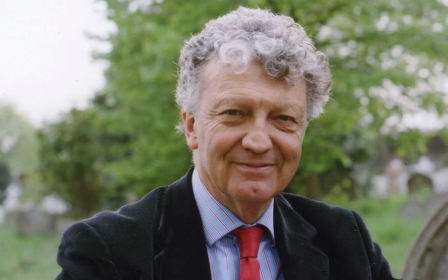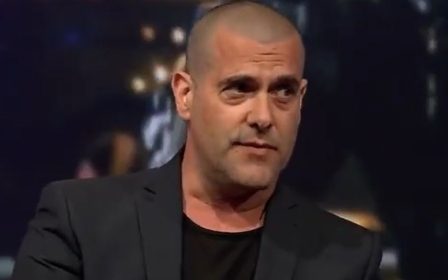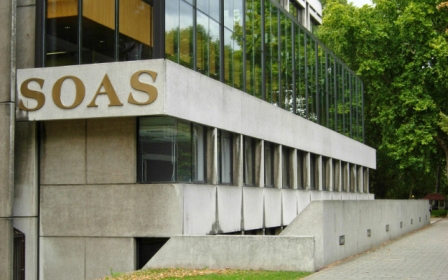Young boy referred to Prevent after talking about Fortnite game

More than 600 children under the age of six were reported to the British government's controversial Prevent programme over a three-year period, including a four-year-old boy who played the video game Fortnite.
British newspaper The Observer reported the figures on Sunday and said the child was referred for talking about his father having “guns and bombs in his shed”, in the context of playing the game.
New MEE newsletter: Jerusalem Dispatch
Sign up to get the latest insights and analysis on Israel-Palestine, alongside Turkey Unpacked and other MEE newsletters
It was clear in the transcript of the conversation that the boy mentioned Fortnite, according to the boy's mother.
She told the newspaper that she believed the boy was only treated as he was because they are Muslim and feared when police turned up at their home late in the evening during the incident in 2019.
Citing freedom of information requests, The Observer reported that 624 children under six and 1,405 between six and nine were reported to Prevent between 2016 and 2019.
Last week the government was criticised for naming as the new head of a review into Prevent the former head of the Charity Commission William Shawcross because of links to right-wing groups and comments on Islam.
Miqdaad Versi, a spokesperson for the Muslim Council of Britain, drew attention to comments attributed to Shawcross in 2012 when he has been quoted as saying: "Islam is one of the greatest, most terrifying problems of our future. I think all European countries have vastly, very quickly growing Islamic populations".
What is the Prevent Strategy?
+ Show - HidePrevent is a programme within the British government's counter-terrorism strategy that aims to “safeguard and support those vulnerable to radicalisation, to stop them from becoming terrorists or supporting terrorism”.
It was publicly launched in the aftermath of the 2005 London bombings and was initially targeted squarely at Muslim communities, prompting continuing complaints of discrimination and concerns that the programme was being used to collect intelligence.
In 2011, Prevent's remit was expanded to cover all forms of extremism, defined by the government as “vocal or active opposition to fundamental British values, including democracy, the rule of law, individual liberty and mutual respect and tolerance of different faiths and beliefs.”
In 2015, the government introduced the Prevent Duty which requires public sector workers including doctors, teachers and even nursery staff to have “due regard to the need to prevent people being drawn into terrorism”.
A key element of Prevent is Channel, a programme that offers mentoring and support to people assessed to be at risk of becoming terrorists. Prevent referrals of some young children have proved contentious. 114 children under the age of 15 received Channel support in 2017/18.
Criticism of the Prevent Duty includes that it has had a “chilling effect” on free speech in classrooms and universities, and that it has turned public sector workers into informers who are expected to monitor pupils and patients for “signs of radicalisation”. Some critics have said that it may even be counter-productive.
Advocates argue that it is a form of safeguarding that has been effective in identifying and helping troubled individuals. They point to a growing number of far-right referrals as evidence that it is not discriminatory against Muslims.
In January 2019 the government bowed to pressure and announced that it would commission an independent review of Prevent. This was supposed to be completed by August 2020. After being forced to drop its first appointed reviewer, Lord Carlile, over his past advocacy for Prevent, it conceded that the review would be delayed.
In January 2021 it named William Shawcross as reviewer. Shawcross's appointment was also contentious and prompted many organisations to boycott the review. Further delays followed. Shawcross's review, calling for a renewed focus within Prevent on "the Islamist threat", was finally published in February 2023 - and immediately denounced by critics.
Shawcross is a former trustee and director member of the Henry Jackson Society, a controversial neoconservative think-tank that has been accused of stoking Islamophobia. He is currently a senior fellow at the right-wing Policy Exchange think tank.
Baroness Warsi, a former Conservative Party chair and longstanding critic of Prevent, said: "Inappropriate appointment that will further toxify a policy which is at best a broken brand at worst has a dubious record of implementation. Another example of the government's dangerously ideological, divisive and flawed understanding of the issues around countering extremism."
Middle East Eye delivers independent and unrivalled coverage and analysis of the Middle East, North Africa and beyond. To learn more about republishing this content and the associated fees, please fill out this form. More about MEE can be found here.




